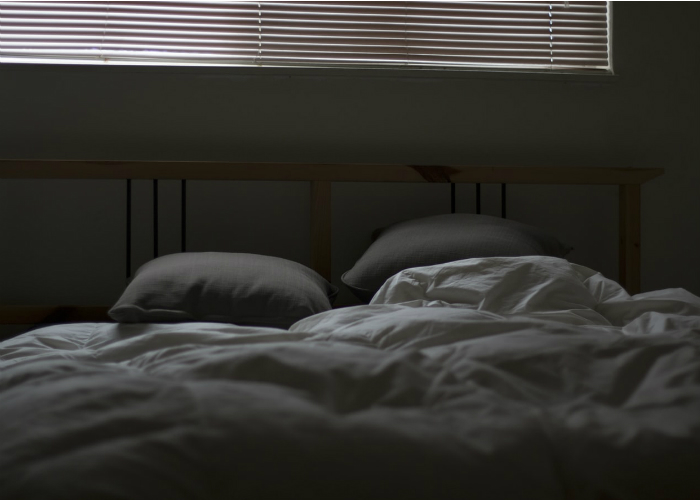5 sleep hacks that can help lose that belly fat

People may have told you that losing weight isn’t only about cutting down your calorie intake, but also exercising regularly. But rarely are we reminded that sleeping on time and getting ample rest can prevent you from obesity.
Weight gain from sleep deprivation happens because with not enough sleep, your mental clarity is decreased, which then affects your ability to judge.
This means it is more likely for you to succumb to fatty and sugary foods or bingeing especially if you are on a diet.
In other words – suddenly, the pint of ice-cream would seem very doable in one sitting.
But shedding excess weight doesn’t have to only occur during your waking hours.
Here are five sneaky bedtime hacks to help you burn away that belly fat while you snooze:
1. SLEEP COLD

Not all fat is bad. In fact, you may even want certain fats to aid you in your weight loss.
Brown fat, also known as brown adipose tissue (BAT), is a fat in your body that uses energy to acclimatise to your surroundings.
This fat can be activated by cold temperatures as an ‘internal heating jacket’ to produce more brown fat cells and burn calories, so sleeping cold may actually help you drop some kilos and make you healthier!
Having more brown fat also translates into having less white adipose tissue (WAT), called white fat.
White fat stores energy from the food you eat.
Belly fat, for example, is white fat – and the fat you most want to reduce.
Sleeping at lower temperatures converts your brown fat into white fat, which can produce good metabolic benefits over time, like better insulin sensitivity and less fatty acids and triglycerides.
2. SLEEP IN THE DARK

Of course most of us sleep in the dark, but we mean in absolute, complete darkness.
This may even mean beyond turning off the lights, like putting your curtains down to block out the lights from your windows.
This is so you can help your body produce melatonin – a sleep-promoting hormone – more efficiently, which is a process that takes place as the sun goes down.
Studies have shown that melatonin production is sensitive to light, and even slight exposure over a short time can impede its production.
This is an issue because melatonin influences your metabolism, particularly in the process of turning brown fat into white fat.
Thus, reducing light exposure from both indoors and outdoors may actually support if not benefit your weight loss regime.
3. HAVE GREEN TEA BEFORE BED

You may have heard this one before, but you might not have known that you can actually drink green tea at night.
It may seem counterintuitive to drink this before sleep when it contains caffeine, but green tea may actually be more sleep-friendly than you think – and it’s definitely diet-friendly.
Green tea contains numerous compounds that can help you burn fat.
[[nid:461791]]
One such antioxidant is epigallocatechin gallate (ECGC), which can improve your metabolism.
This compound may even work hand-in-hand with caffeine, which also stimulates weight loss with brown fat.
While caffeine does keep you up, the caffeine in green tea only exists at one-third the caffeine in a cup of coffee.
Some may even say that the theanine in green tea – a hormone that reduces stress and promotes sleep – counters the promotion of wakefulness in caffeine, so if you’re not extremely sensitive to caffeine, you’re probably good to go.
4. SWITCH OFF YOUR PHONE

According to researchers, children with one or more electronic devices in the bedroom were more likely to be overweight. In fact, they are 1.47 times more likely – and 2.57 more likely for children with three devices.
This ties in with better physical activity and diet choices because of insufficient sleep from being distracted.
The body often tries to make up for the lack of sleep with overeating as the hunger hormone, ghrelin, rises.
Reduced energy also means you’re less committed to physical chores, from hitting the gym all the way to daily activities like cleaning.
As if that’s not enough, the weight gain may also be due to the blue light emitting from smartphones.
Blue light hampers with the production of melatonin, as with the light of your bedroom or from outdoors – so it might benefit you to keep those electronics away at bedtime.
5. SIMPLY SLEEP EARLY

Like all other bodily processes, you burn calories as you sleep – even if you think you’re not actually doing anything.
In fact, your body burns more calories when you’re soundly sleeping than when you’re lying in bed awake.
The most amazing part is that the better you sleep, and the longer you sleep, the more calories you burn!
This is because deep sleep, also known as the Rapid Eye Movement (REM) sleep stage, is when your brain is the most active.
As your brain uses this energy, your body continually produces glucose to fuel this activity, even while you are sleeping.
On average, a person weighing 52kg will lose around 42 calories per hour of sleep.
This article was first published in Women's Weekly.